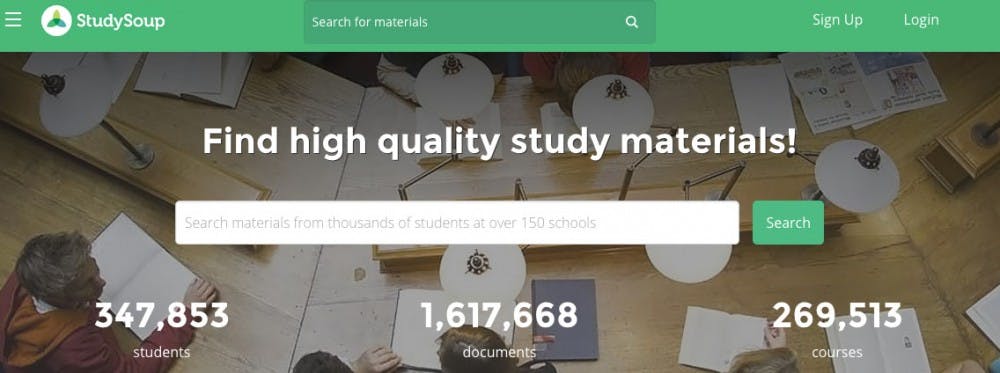College students are always trying to find ways to earn some extra money.
For some students, using StudySoup — an online site that allows students to get paid for each set of class notes they share with other students — has been their solution for this.
However, there can be copyright issues when students share notes given by their teachers.
Last semester, Debbie Rogers, deputy associate provost, brought StudySoup to the attention of the University Senate. Rogers was not speaking on behalf of what faculty should do, just raising awareness of the site.
In Fall 2014, Kum-Kum Bhavani, chairwoman of the Academic Senate at the University of California, Santa Barbara, emailed Ball State to tell the university about StudySoup.
“While students are only supposed to post material that they have created or for which they have permission to post, in many cases faculty-authored material is posted and commercially distributed on these sites without permission,” Bhavani said in the email.
StudySoup does not allow students to upload teacher handouts — only notes they compile themselves.
The company approves the notes before making them public for others to see. If a student sells a set of notes or a study guide, they make $8. As students purchase notes, the seller can earn points. After a certain amount is earned, they can use it as real money to purchase other study materials.
Bhavani said StudySoup does not accurately exemplify how a university education should proceed.
She said when students purchase notes from other students, they may not feel the need to attend lectures, read or complete other requirements for that course.
However, junior accounting major Danielle O’Riley uses the site to sell her notes and said it is beneficial. She has made $33 since she started using StudySoup this semester.
“I think it's a good site, an easy way to make a little extra money," O'Riley said. "Plus it helps you study more if you are rewriting or going through your notes again."
O'Riley hopes her notes will help both those who do and don't go to class. She said her notes can provide extra clarification if another student is not the best note taker.
"They have to pay for the notes so they would be better off if they just went to class," O'Riley said. "I also think you learn better in the classroom rather than just reading notes."
O'Riley said StudySoup could decrease the quality of education if a majority of students used it instead of going to class.
Freshman public relations major Sarah Foster uses the site to sell notes for her History 150 course. She has made $8 so far in selling notes and a study guide.
“I use it so other students who may not take as fast notes [or] as efficient notes so they can get them online from a source they know they can rely on,” Foster said. "What I do is to the best to my ability try not to take exact word-for-word notes, and I usually add my own images and little key hints as to what this [lecture] is about."
Foster wants her notes to be for anyone who has trouble keeping up with notes in class regardless of them attending class.
"Most people who skip [class] won't understand much of the material since [the notes are] primarily visuals with some lecture that I paraphrase," Foster said.
When users start on StudySoup, they are required to go through an online orientation to get acclimated with the site.
Bruce Frankel, a professor of urban planning, said to him, StudySoup poses no threat to an instructor's materials.
He said sharing notes and making a profit is a part of the entrepreneurial learning initiative that Ball State has started to implement and encourage this year.
“Here is an attempt at entrepreneurship. In the real sense — not just studying it in class — but actually doing something that creates an enterprise from which you can make money and provide a service,” Frankel said.
However, Frankel said he is concerned with the quality of education received through shortcuts like StudySoup. He is not endorsing the site itself, but endorsing the concept of free trade that it allows.
He said it's better to read the book and come to class than to rely on other students for their notes that may or may not be of good quality.
“I don’t know how notes can be a substitute for class,” Frankel said.
However, he said students helping other students is a legitimate basis for learning. In all of his urban planning courses, Frankel encourages student collaboration within projects and assignments.
He compared StudySoup to that of study groups that students often arrange for exams, but he said with the amount of money being put in for a student’s education, they should not squander it away with a “half-baked” education by simply relying only on notes and not going to class.





